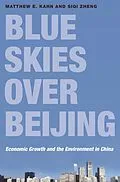How individuals and the government are changing life in China's polluted cities
Over the past thirty years, even as China's economy has grown by leaps and bounds, the environmental quality of its urban centers has precipitously declined due to heavy industrial output and coal consumption. The country is currently the world's largest greenhouse-gas emitter and several of the most polluted cities in the world are in China. Yet, millions of people continue moving to its cities seeking opportunities. Blue Skies over Beijing investigates the ways that China's urban development impacts local and global environmental challenges. Focusing on day-to-day choices made by the nation's citizens, families, and government, Matthew Kahn and Siqi Zheng examine how Chinese urbanites are increasingly demanding cleaner living conditions and consider where China might be headed in terms of sustainable urban growth.
Kahn and Zheng delve into life in China's cities from the personal perspectives of the rich, middle class, and poor, and how they cope with the stresses of pollution. Urban parents in China have a strong desire to protect their children from environmental risk, and calls for a better quality of life from the rising middle class places pressure on government officials to support greener policies. Using the historical evolution of American cities as a comparison, the authors predict that as China's economy moves away from heavy manufacturing toward cleaner sectors, many of China's cities should experience environmental progress in upcoming decades.
Looking at pressing economic and environmental issues in urban China, Blue Skies over Beijing shows that a cleaner China will mean more social stability for the nation and the world.
Autorentext
Matthew E. Kahn is professor of economics and spatial statistics at the University of Southern California. His books include Climatopolis (Basic), Green Cities (Brookings), and Heroes and Cowards (Princeton). Siqi Zheng is a professor and the director of the Hang Lung Center for Real Estate at Tsinghua University in China, and the deputy head of the university's Department of Construction Management.
Zusammenfassung
How individuals and the government are changing life in China's polluted citiesOver the past thirty years, even as China's economy has grown by leaps and bounds, the environmental quality of its urban centers has precipitously declined due to heavy industrial output and coal consumption. The country is currently the world's largest greenhouse-gas emitter and several of the most polluted cities in the world are in China. Yet, millions of people continue moving to its cities seeking opportunities. Blue Skies over Beijing investigates the ways that China's urban development impacts local and global environmental challenges. Focusing on day-to-day choices made by the nation's citizens, families, and government, Matthew Kahn and Siqi Zheng examine how Chinese urbanites are increasingly demanding cleaner living conditions and consider where China might be headed in terms of sustainable urban growth.Kahn and Zheng delve into life in China's cities from the personal perspectives of the rich, middle class, and poor, and how they cope with the stresses of pollution. Urban parents in China have a strong desire to protect their children from environmental risk, and calls for a better quality of life from the rising middle class places pressure on government officials to support greener policies. Using the historical evolution of American cities as a comparison, the authors predict that as China's economy moves away from heavy manufacturing toward cleaner sectors, many of China's cities should experience environmental progress in upcoming decades.Looking at pressing economic and environmental issues in urban China, Blue Skies over Beijing shows that a cleaner China will mean more social stability for the nation and the world.
Inhalt
Acknowledgments ix
Chapter One: Introduction 1
Part I: A Geographic Overview of Urban Pollution Production in China
Chapter Two: Made in China 21
Chapter Three: The Migration to Cities 50
Chapter Four: The Causes and Consequences of Chinese Suburbanization 76
Chapter Five: Private Vehicle Demand in Urban China 108
Part II: The Rising Demand for Green Cities
Chapter Six: The Rising Demand for Blue Skies and Urban Risk Reduction 135
Chapter Seven: Recent Empirical Evidence on the Demand for Lower Pollution Levels 147
Part III: Promoting Environmental Accountability in a One-Party State
Chapter Eight: The Central Government's Increased Desire to Promote Environmental Sustainability 159
Chapter Nine: Will Local Governments Create Green Cities? 186
Chapter Ten: Conclusion 212
Appendix 1 233
Appendix 2 235
Notes 237
Index 263
